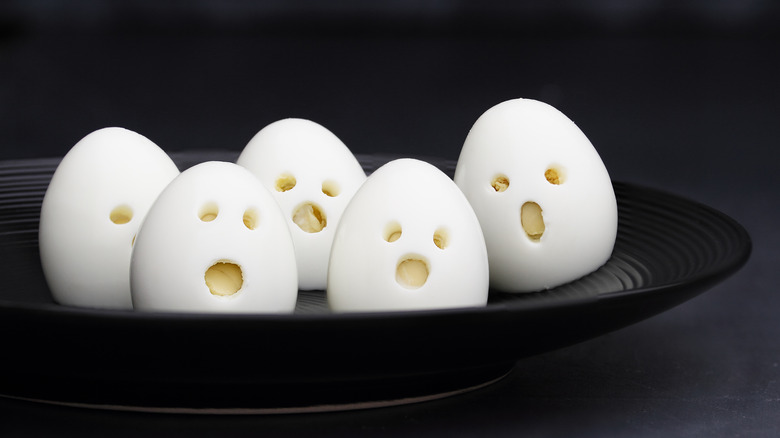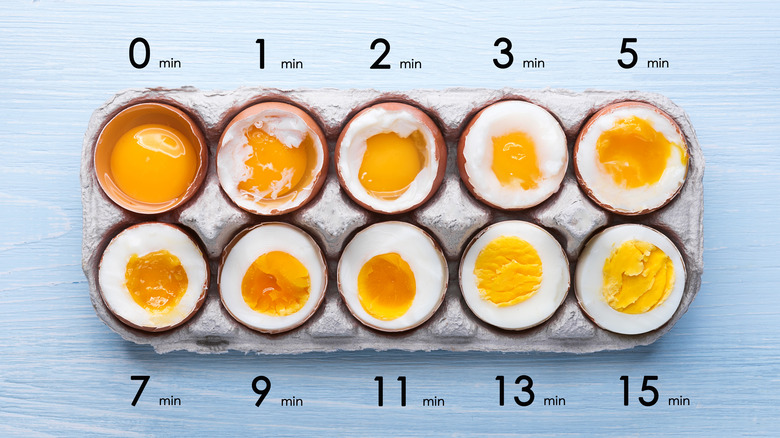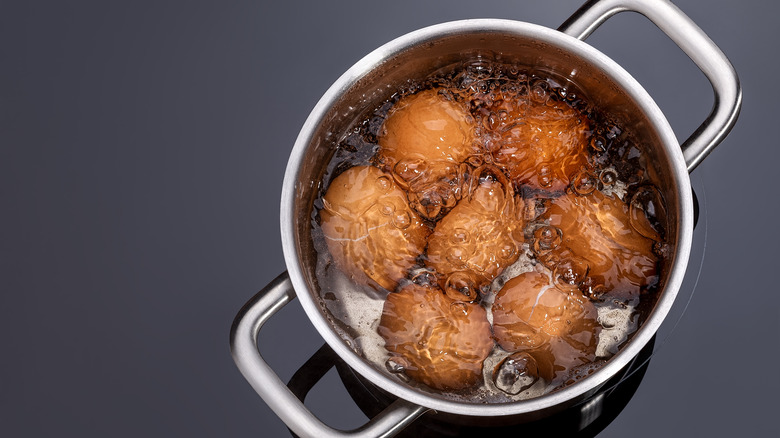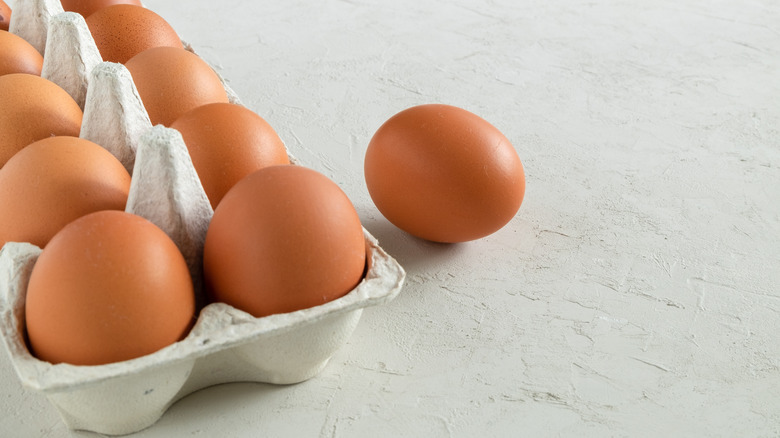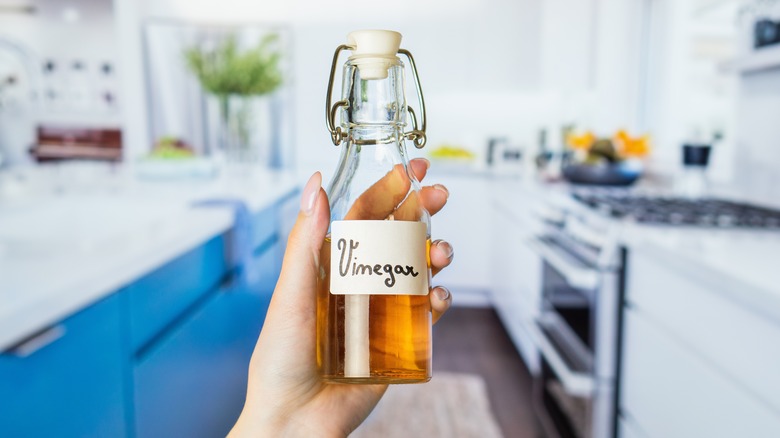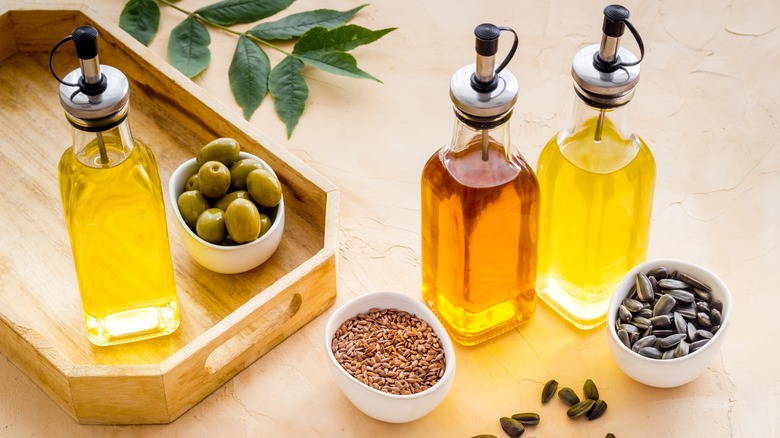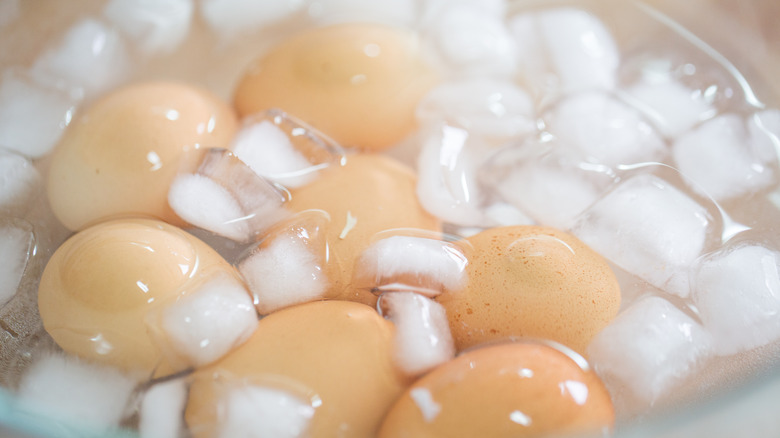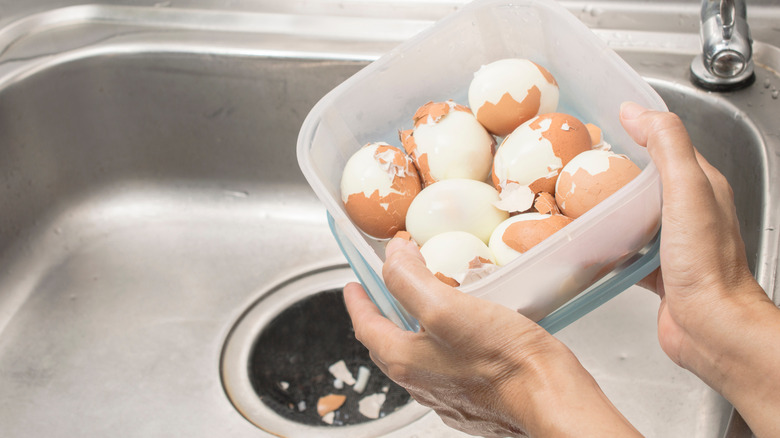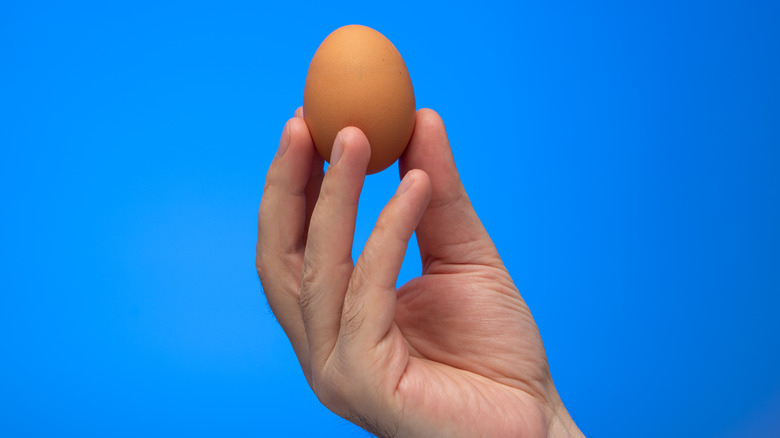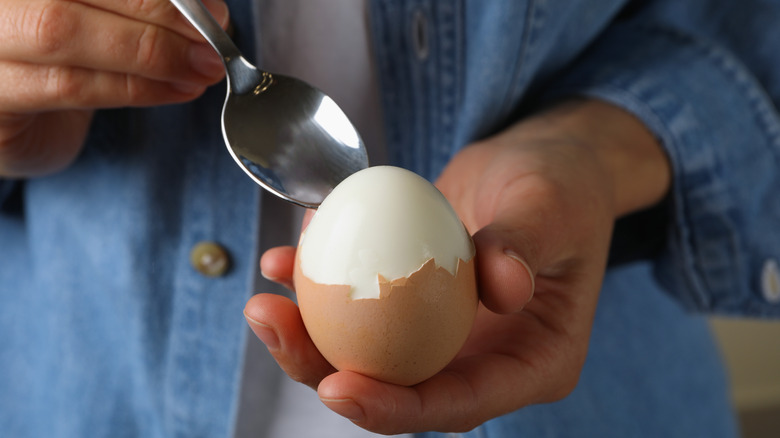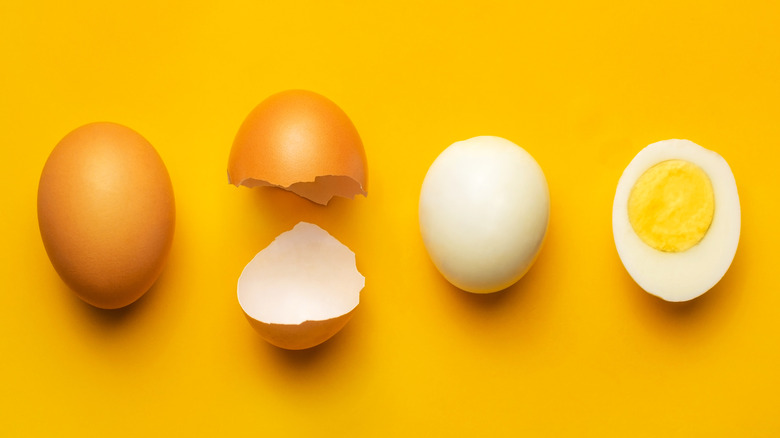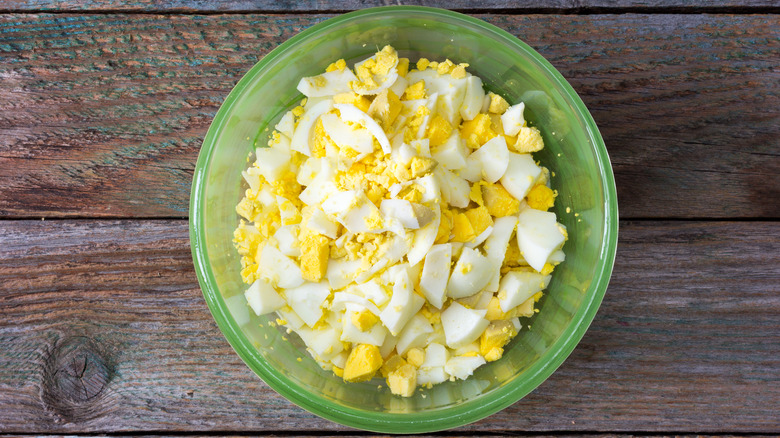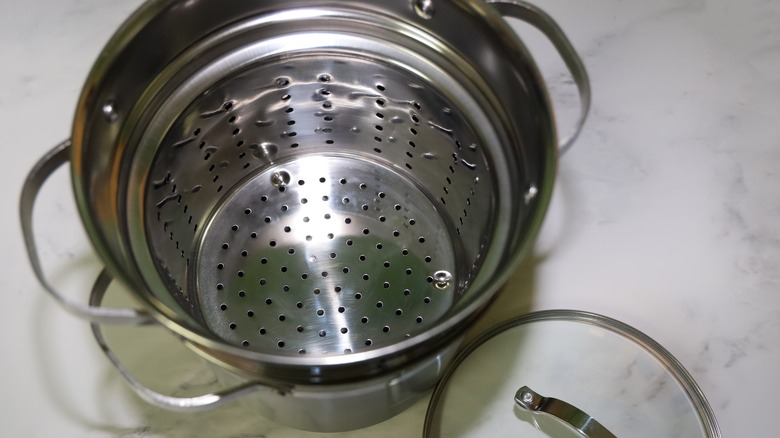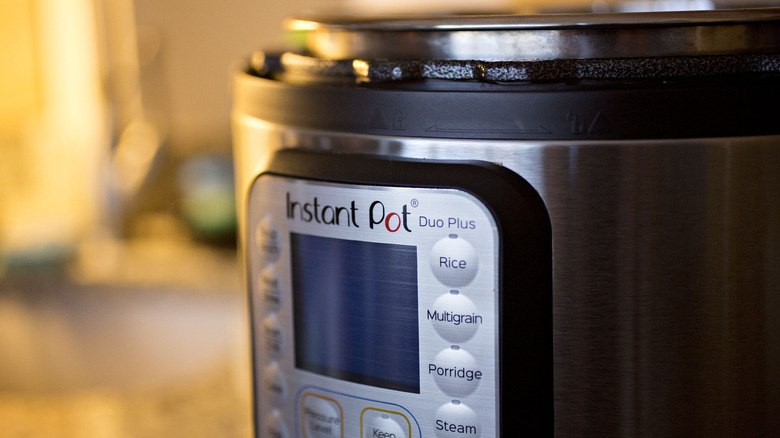14 Hard-Boiled Egg Hacks You Need To Know About
How can such a simple snack as a hard-boiled egg be so challenging to make? Nothing is worse than spending 10 minutes of your life attempting to peel the shell off of a hard-boiled egg — especially when you're hungry. Eggs are a tasty and nutrient-dense food with many health benefits, like supporting the immune system, improving eyesight, boosting brain health, and even reducing bloating. Starting your day off with eggs for breakfast has been shown to boost your metabolism and make you feel full for longer — which is great for long days at the office or traveling (per Kent Health Care Products).
On top of that, hard-boiling eggs is a healthy way to get all the nutrients eggs have to offer, without needing additional fats like oil or butter to fry them up in a pan. Hard-boiled eggs are considered a low-calorie food and a good source of lean protein, since one egg carries only 77 calories, about 5 grams of fat, and 6 grams of protein (via Healthline). They also provide a wide range of vitamins, minerals, and amino acids, including vitamin D, vitamin A, phosphorus, selenium, zinc, calcium, and all of the B vitamins.
But are you cooking your hard-boiled eggs the right way? Let's explore some fun hard-boiled egg hacks that will level up your egg game and make your life a whole lot easier.
1. Use older eggs
Have you ever heard "fresh is always best?" Well, hard-boiled eggs are an exception to this rule. Even though farm-fresh eggs seem so appealing — with their bright, golden yolks and high nutritional value when compared to store-bought eggs (via Backyard Boost) — as a general rule of thumb, when it comes to hard-boiled eggs, older eggs are easier to peel. This is due to their chemistry. Fresh eggs contain carbon dioxide, which slowly releases through tiny pores in the egg shell, resulting in a pH shift, with the egg becoming less acidic. This shift causes a weaker bond between the egg white and membrane, making it easier to peel (via Slate). Over time, the egg also loses moisture, which helps create air pockets in between the membrane and egg white.
When purchasing eggs from a grocery store, check the Julian date on the eggs' carton — the three numbers ranging from 001 for January 1 to 365 for December 31 — this indicates when the eggs were packaged. Waiting around seven to 10 days after this date before hard-boiling is best. You can still purchase eggs from the farmers market to hard-boil; just keep in mind that chickens naturally produce a coating over their eggs that can seal in the carbon dioxide. This coating is washed off on commercial eggs, but usually not on farm-fresh eggs. Therefore, it's best to wait at least ten days after purchase before hard-boiling these types of eggs.
2. Add baking soda to the boiling water
This trick works really well for procrastinators. Picture this: You promised to bring deviled eggs to tonight's dinner party, but you can only find fresh eggs at the grocery store. And you need to hard-boil them right now. You know those fresh eggs will take forever to peel, resulting in you being very late to the party. If you find yourself in a scenario like this, remember — baking soda is your best friend.
Harold McGee, author of the book "On Food and Cooking: The Science and Lore of the Kitchen," writes, "If you end up with a carton of very fresh eggs and need to cook them right away, you can add a half teaspoon of baking soda to a quart of water to make the cooking water alkaline (though this intensifies the sulfury flavor)" (via Wired). This will help shift the pH, which, in turn, will make your fresh eggs easier to peel. And according to the Food Network, adding 1 teaspoon to a pot of boiling eggs will make them easier to peel, regardless if they are fresh or aged.
3. Add the eggs after the water has boiled
Another key step to making hard-boiled eggs that are easy to peel is always putting the eggs in the pot after the water has reached boiling point. While it's totally okay to start the eggs in cold water and bring that to a boil, placing the eggs in already boiling water is best when it comes to easy-to-peel hard-boiled eggs, according to Today.
To try it out, bring a large pot of water to a rolling boil and then slowly lower the eggs in using a steamer basket or slotted spoon. Lower them gently and place them in a single layer along the bottom of the pot to avoid cracking the shells (per the Food Network). Keep the heat on high for about 30 seconds, lower to a simmer, and cover the pot with a lid. Don't forget to set your timer to achieve your desired egg yolk consistency.
4. Add vinegar to your water
Adding vinegar to the water while you hard-boil eggs is a life hack with several benefits. First of all, the vinegar helps makes the eggs easier to peel. According to Forkly, add ¼ cup of vinegar and a pinch of salt to the water, and voila: easy peeling. The vinegar also helps stifle that less-than-desirable hard-boiled egg smell (via Real Simple).
Plus, if you're using older eggs, they can be more susceptible to cracking during the boiling process. Adding vinegar to the water doesn't necessarily stop this from happening, but if they do crack, it helps keep the egg white inside the shell, instead of seeping out into the boiling water. If you don't have any vinegar around the kitchen, you can also try using lemon juice. Whatever you use, there is a catch, though: Do not let the eggs sit in the vinegar water solution after they are done. They should be immediately removed, since over time, vinegar can dissolve the egg shells.
5. Add a touch of oil to the water
According to Bowl of Delicious, this one hack will guarantee you hard-boiled eggs that are easy to peel, every time. Simply add 1 tablespoon of any type of oil, including olive, canola, or vegetable oil, to your pot of boiling water. As previously mentioned, egg shells are porous, releasing carbon dioxide and moisture over time and forming air pockets. Have you ever heard of the hack where you put old eggs in a bowl of water to see if they've gone bad? If they sink, you can still eat them, but if they float, that means they are too old. The older the egg, the more air has seeped inside the shell, which makes it float.
Because egg shells are porous, the oil can permeate into the shells, creating a thin layer of oil between the shell and egg white. This slippery oil layer encourages the egg shell to satisfyingly slide right off when peeling. It's similar to rubbing oil on your finger to help slip off a ring that is stuck.
6. Give them a bath of ice water
There are many helpful tricks while cooking hard-boiled eggs to set you up for easy peeling, but what about after they're done cooking? You may have already heard of the ice water hack for hard-boiled eggs. Well, this trick is essential. As soon as your egg timer goes off, immediately transfer them to a bowl of ice water. Not only does this stop the cooking process and help you avoid overcooking your eggs, but it also makes the peeling step so much easier.
To do this, once you've boiled your eggs for the desired amount of time, gently transfer them to the ice water bowl using a slotted spoon. A metal bowl is ideal because it will help keep the water temperature cold. Allow the eggs to sit in the ice water bath for about 15 minutes or until they feel completely cool.
7. Shake them
This next hack can be combined with the ice water trick or done on its own. After your timer goes off, remove your eggs from heat and strain out the hot water. Gently transfer the eggs into a plastic container, add some cold water, and then put the lid on and shake it gently. Shake, shake, shake until the egg shells come off. This method works well if you have six or more eggs in the container, and they are hard-boiled, not soft-boiled.
If you have a smaller amount of eggs, you can still practice this hack simply by using a smaller container. For example, if you're working with just one egg, place it inside a drinking glass and fill it with water. Place your hand over the mouth of the glass and give it a powerful shake until the shell comes off. It may sound weird, but it works!
8. Blow on them
Speaking of weird, this next hack may leave you feeling a little silly. It's also involves putting your mouth on the egg and blowing into it, so save this trick for eggs you plan on consuming yourself. To try it out, you'll start with hard-boiled eggs that you just removed from heat. Take off a tiny piece of shell on both the pointy end and the larger, rounded end of the egg. Then, pick a side, place your mouth around the opening, and blow into it. The theory of this trick is that blowing air through the egg will help separate the membrane from the egg white, making it easier to peel.
This hack seems to work sometimes, but it's not always a reliable trick. Comedian Judy Gold tried this method several times with no success for a segment for Food & Wine. Feeling defeated, she said, "Who wants an egg with all my saliva all over it?" It's still worth a try, but we can't guarantee you success.
9. Use a spoon to help you peel them
Using a spoon to help you peel hard-boiled eggs can be a game changer. This hack comes highly recommended by Food & Wine culinary director Justin Chapple, who has tried this method several times with consistent success. To try it out for yourself, start with a hard-boiled egg that just came out of an ice water bath and is ready to peel.
To begin, strike the egg on a hard surface, just enough to get it to crack so that you can remove a small piece of egg shell. Then, slide a small spoon in between the shell and egg membrane and slowly move the spoon along so that it follows the curvature of the egg. With a little practice, this method will help you gently remove the shell without big hunks of egg white coming along with it, according to Southern Living.
10. Use the thumbtack hack
The thumbtack hack is a trick you'll want to try right before you put the eggs in hot water. To start, you'll need a clean thumbtack and an uncooked egg. According to Chef George Weld, this trick makes peeling hard-boiled eggs a walk in the park (via Self). He works at the Brooklyn restaurant named Egg, so to say he is experienced in cooking eggs is an understatement. To try this method, pierce the larger end of a raw egg shell with the thumbtack and then remove it and move forward with the cooking process.
There are several theories as to why this trick works. It could be that hot water enters the small hole while it cooks, getting in between the shell and the membrane, which makes it easier to peel off. Or maybe the tiny hole is enough to release the gases inside the egg, simplifying the peeling process. Either way, it works.
11. Avoid peeling altogether with this TikTok hack
Life hacks are TikTok's specialty, but not every TikTok video with the #hack hashtag is worth trying — like the one where you stick garlic up your nose to cure congestion. Big surprise: It doesn't work. But this no-peel hard-boiled egg hack is legit. The original TikTok video was posted by health foodie Jamie Fielding and has received over 13 million views. Note that this hack only really works for cooking up big batches of hard-boiled eggs that will be chopped up for a recipe, like egg salad sandwiches or a Cobb salad.
Here's how it works: Grease up a loaf pan with oil or butter — Fielding uses avocado oil — and then crack the eggs into the pan. Place the loaf pan into a larger glass baking dish and then fill the dish with water up to the same height as the eggs. Cook it in the oven at 350 degrees Fahrenheit for about 30 minutes. When they're done, slide a spatula between the eggs and pan, flip the pan over, and let the eggs drop onto a cutting board. Now they're ready to be sliced up and added to your favorite recipe.
12. Steam, don't boil
Another TikTok egg hack video you need to know about is steaming your eggs instead of boiling them. An 8-second video posted by food blogger and chef Kathleen Ashmore holds the caption, "Chef tip! I haven't hard boiled an egg in 10 years." The video shows Ashmore steaming the eggs, with captions further explaining that "the hot steam makes the egg white proteins contract, pulling away from the shell membrane" and the "shells slide right off."
According to HuffPost, the eggs will cook faster this way, and the result will be a more tender egg. To try it out, fill a pot with 1 inch of water, place your steamer basket inside, cover it with a lid, and turn on the heat. When you begin to notice steam, gently add your eggs to the basket and set your timer. Six minutes will give you soft-boiled eggs, and 11 to 12 minutes will deliver hard-boiled ones. Just be sure to end with the ice water bath to stop them from overcooking.
13. You don't have to use the stove top
While making hard-boiled eggs on the stove top is tried and true, there are many different kitchen tools you can use for boiled egg hacks. The most obvious choice is an electric egg cooker, a gadget that was essentially created to help you always make the perfect hard-boiled egg. You can also cook them in a crock pot, but it will take two and a half hours, just as most meals in a crock pot go: slow and steady.
If you have an Instant Pot, you can boil eggs in it using the "rule of fives": Wait five minutes for the pot to heat up, five minutes for the eggs to cook, five minutes for the Instant Pot to release steam, and then five minutes as the eggs sit in an ice water bath. And if you're feeling adventurous, you can cook eggs in your dishwater by placing them in a glass Mason jar filled with water and screwing on the lid. Most dishwashers only heat up to 130 to 140 degrees Fahrenheit, though (via Finish), so this method will deliver soft-boiled eggs, not hard ones.
14. Try cooking eggs in a muffin pan
One of the most simple and fun ways to hard-boil eggs without using the stove top is by cooking them in a muffin pan. Just place each egg, complete with its shell, in each muffin tin divot and cook it in the oven at 325 degrees Fahrenheit for about 30 minutes. If you want a soft-boiled egg, cook them for about 20 minutes, and a medium-boiled egg will take around 25 minutes. And of course, make sure to follow up with an ice bath.
The muffin tin is also a great kitchen tool for making poached eggs seem like a breeze. Simply crack one egg in each muffin holder, compost the egg shell, and pour about 1 tablespoon of water in with each egg. Add in any seasonings you wish and cook them in the oven at 350 degrees Fahrenheit for nine to 15 minutes, depending on your desired consistency.
